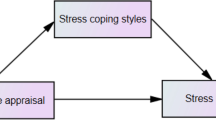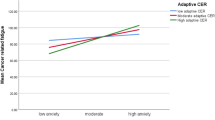Abstract
Purpose
Cancer patients undergoing chemotherapy are prone to suffering a higher incidence rate of depression, leading to poor quality of life. However, how cancer affects depression is unclear. This study aimed to examine whether the relationship between cognitive appraisal and depression is mediated by perceived stress and self-efficacy in cancer patients undergoing chemotherapy.
Methods
A total of 421 cancer patients undergoing chemotherapy participated in this cross-sectional survey. Cognitive appraisal of cancer, perceived stress, self-efficacy, and depression were measured with the Perceived Life Threat Scale, Perceived Stress Scale, General Self-efficacy Scale and Hospital Anxiety, and Depression Scale-Depression Scale, respectively. Path analysis was performed to analyze the mediating effects of perceived stress and self-efficacy on the relationship between cognitive appraisal of cancer and depression.
Results
Cognitive appraisal of cancer exerted direct (b = 0.066, SE = 0.020, p < 0.001, bias-corrected 95% CI = [0.027, 0.106]) and indirect (mediated by depression and insomnia) (b = 0.136, SE = 0.015, p < 0.001, bias-corrected 95% CI = [0.107, 0.167]) effects on depression. Perceived stress and self-efficacy were significant in mediating the relationship between cognitive appraisal of cancer and depression (b = 0.101, SE = 0.014, p < 0.001, bias-corrected 95% CI = [0.074, 0.132]; b = 0.021, SE = 0.006, p < 0.001, bias-corrected 95% CI = [0.006, 0.028], respectively). Additionally, a sequential mediating effect of perceived stress via self-efficacy was found, and the mediating effect size was 0.014 (p < 0.01, bias-corrected 95% CI = [0.010,0.034]).
Conclusions
This study suggests that medical staff could prevent or relieve depression through improving self-efficacy or reducing perceived stress in cancer patients undergoing chemotherapy.


Similar content being viewed by others
Data Availability
The data are available from the corresponding author on reasonable request.
References
Flanagan MW, Goltz HH, Henson JW et al (2022) Associations of practical, emotional, and physical problems with psychosocial distress among cancer patients. J Psychosoc Oncol 40(1):98–114. https://doi.org/10.1080/07347332.2021.1899353
Riedl D, Schuessler G (2022) Prevalence of depression and cancer – a systematic review. Z Psychosom Med Psychother 68(1):74–86. https://doi.org/10.13109/zptm.2021.67.oa11
Wen S, Xiao H, Yang Y (2019) The risk factors for depression in cancer patients undergoing chemotherapy: a systematic review. Support Care Cancer 27(1):57–67. https://doi.org/10.1007/s00520-018-4466-9
Sung H, Ferlay J, Siegel RL et al (2021) Global Cancer Statistics 2020: GLOBOCAN estimates of incidence and mortality worldwide for 36 cancers in 185 countries. CA Cancer J Clin 71(3):209–249. https://doi.org/10.3322/caac.21660
Zahid JA, Grummedal O, Madsen MT et al (2020) Prevention of depression in patients with cancer: a systematic review and meta-analysis of randomized controlled trials. J Psychiatr Res 120:113–123. https://doi.org/10.1016/j.jpsychires.2019.10.009
Gallagher J, Parle M, Cairns D (2011) Appraisal and psychological distress six months after diagnosis of breast cancer. Br J Health Psychol 7(3):365–376. https://doi.org/10.1348/135910702760213733
Cohen S, Kamarck T, Mermelstein R (1983) A global measure of perceived stress. J Health Soc Behav 24(4):385–396
Huh HJ, Kim KH, Lee HK et al (2021) Perceived stress, positive resources and their interactions as possible related factors for depressive symptoms. Psychiatry Investig 18(1):59–68. https://doi.org/10.30773/pi.2020.0208
Bandura A, Wood RE (1989) Effect of perceived controllability and performance standards on self-regulation of complex decision making. J Pers Soc Psychol 56:805–814. https://doi.org/10.1037//0022-3514.56.5.805
Bandura A (1977) Self-efficacy: toward a unifying theory of behavioral change. Psychol Rev 84(2):191–215. https://doi.org/10.1037//0033-295x.84.2.191
Wang L, Luo J, Li Y et al (2022) Social support, anxiety, and depression in patients with prostate cancer: complete mediation of self-efficacy. Support Care Cancer 30(8):6851–6856. https://doi.org/10.1007/s00520-022-07065-8
Rowntree RA, Hosseinzadeh H (2022) Lung cancer and self-management interventions: a systematic review of randomised controlled trials. Int J Environ Res Public Health 19(1):536. https://doi.org/10.3390/ijerph19010536
Poręba-Chabros A, Kolańska-Stronka M, Mamcarz P, Mamcarz I (2022) Cognitive appraisal of the disease and stress level in lung cancer patients. The mediating role of coping styles. Support Care Cancer. 30(6):4797–4806. https://doi.org/10.1007/s00520-022-06880-3
Ellis KR, Janevic MR, Kershaw T, Caldwell CH, Janz NK, Northouse L (2017) The influence of dyadic symptom distress on threat appraisals and self-efficacy in advanced cancer and caregiving. Support Care Cancer 25(1):185–194. https://doi.org/10.1007/s00520-016-3385-x
Martin K, Flood A, Pyne DB, Périard JD, Keegan R, Rattray B (2021) The impact of cognitive, physical, and psychological stressors on subsequent cognitive performance. Hum Factors 30:187208211065548. https://doi.org/10.1177/00187208211065548
Maciejewski PK, Prigerson HG, Mazure CM (2000) Self-efficacy as a mediator between stressful life events and depressive symptoms. Br J Psychiatry 176(7):373–378
Lazarus RS, Folkman S (1984) Stress, appraisal and coping. Springer, New York, pp 1–460
Arenella K, Steffen AM (2020) Self-reassurance and self-efficacy for controlling upsetting thoughts predict depression, anxiety, and perceived stress in help-seeking female family caregivers. Int Psychogeriatr 32(2):229–240. https://doi.org/10.1017/S104160219000565
Yang TZ, Huang HT (2003) Epidemiological study on psychological stress among urban residents during social transformation. Chin J Epidemiol 24(9):11–15
Schwarzer R, Born A (1997) The assessment of optimistic self-beliefs: comparison of the Chinese, Indonesian, Japanese, and Korean versions of the General Self-Efficacy Scale. Psychologia 40(1):1–13
Schwarzer R, Mueller J, Greenglass E (1999) Assessment of perceived general self-efficacy on the Internet: data collection in cyberspace. Anxiety Stress Coping 12(2):145–161
Zhang, Schwarzer R (1995) Measuring optimistic self-beliefs a Chinese adaptation of the general daptation of the General Self-efficacy Scale. Psycholo-gia 38(3):174–181
Zigmond AS, Snaith RP (1983) The hospital anxiety and depression scale. Acta Psychiat Scand 67(6):361–370. https://doi.org/10.1111/j.1600-0447
Ye WF, Xu JM (1993) The Application and Evaluation of the Comprehensive Hospital Anxiety and Depression Scale in patients in comprehensive hospitals. Chin J Behav Med Brain Sci 3:17–19
Zheng LL, Wang YL, Li HC (2003) Application of hospital anxiety and depression scale. In general hospital an analysis in reliability and validity. Shanghai Arch Psychiatry 15(5):264–6
Shuai Z, Yanzhu Q, Ling Z (2021) etc A study on the current status and influencing factors of body image in postoperative chemotherapy patients with gynecological cancer. Nurs Res 35(2):306–310. https://doi.org/10.12102/j.issn.1009-6493.2021.02.022
Henneghan A, Stuifbergen A, Becker H, Kesler S, King E (2018) Modifiable correlates of perceived cognitive function in breast cancer survivors up to 10 years after chemotherapy completion. J Cancer Surviv 12(2):224–233. https://doi.org/10.1007/s11764-017-0661-927
Park JH, Jung YS, Jung YM, Bae SH (2019) The role of depression in the relationship between cognitive decline and quality of life among breast cancer patients. Support Care Cancer 27(7):2707–2714. https://doi.org/10.1007/s00520-018-4546-x
Chen LT, Cheng CT, Huang IP, Chang JH, Chang NT, Hsiao FH (2021) The multiple mediating effects of cancer threat appraisal and quality of life on the association between mindfulness and depression for colorectal cancer survivors. Psychooncology 30(6):853–862. https://doi.org/10.1002/pon.5644
Priede A, Rodríguez-Pérez N, Hoyuela F et al (2022) Cognitive variables associated with depressive and anxiety symptoms in patients with cancer: a five-year follow-up study. Psychooncology 31(5):798–805. https://doi.org/10.1002/pon.5864
Beck AT (1976) Cognitive therapy and the emotional disorders. International Universities Press, New York
Boals A (2012) Effects of traumatic stress and perceived stress on everyday cognitive functioning. Cogn Emot 26(7):1335–1343. https://doi.org/10.1080/02699931.2011.651100
Hewitt PL, Flett GL, Shawn W (1992) The Perceived Stress Scale: factor structure and relation to depression symptoms in a psychiatric sample. J Psychopathol Behav 14(3):247–257
Cristóbal-Narváez P, Haro JM, Koyanagi A (2020) Perceived stress and depression in 45 low-and middle-income countries. J Affect Disord 274:799–805. https://doi.org/10.1016/j.jad.2020.04.020
Li J, Gao W, Yang Q et al (2021) Perceived stress, anxiety, and depression in treatment naïve women with breast cancer: a case-control study. Psychooncology 30(2):231–239. https://doi.org/10.1002/pon.5555
Albrecht K, Droll H, Giesler JM, Nashan D, Meiss F, Reuter K (2013) Self-efficacy for coping with cancer in melanoma patients: its association with physical fatigue and depression. Psychooncology 22(9):1972–1978. https://doi.org/10.1002/pon.3238
Schönfeld P, Brailovskaia J, Zhang XC et al (2019) Self-efficacy as a mechanism linking daily stress to mental health in students: a three-wave cross-lagged study. Psychol Rep 122(6):2074–2095. https://doi.org/10.1177/0033294118787496
Acknowledgements
We would like to thank the patients for participating in our study, and we thank Mr. Shaowei Lin for his assistance with data analysis.
Funding
This work was supported by the National Natural Science Fund of China [Grant Number: 81401863] and the Fujian Science and Technology Innovation Joint Fund [Grant Number: 2017Y9107].
Author information
Authors and Affiliations
Contributions
Ying Liu and Shuangshuang Wen was responsible for the acquisition of data and manuscript drafting, and they contributed equally to this manuscript. Huimin Xiao was responsible for conception and design of the study, critical revision of the manuscript, and supervision. Jianwei Zheng was responsible for recruiting participants, data analysis, and supervision. Huimin Xiao and Jianwei Zheng contributed equally to this manuscript. Ying Chen was responsible for analysis and interpretation of data. All authors read and approved the final manuscript.
Corresponding author
Ethics declarations
Ethics approval and consent to participate
This study was approved by the Fujian Medical University Review Board ([2014] No.114). Consent has been received from all participants in this study. During the research, all members strictly adhered to the principle of bioethics proposed by Beauchamp and Childress, including independent principle, confidentiality principle, and inoffensive principle.
Consent for publication
These data have not been presented or published elsewhere.
Competing interests
The authors declare no competing interests.
Additional information
Publisher's Note
Springer Nature remains neutral with regard to jurisdictional claims in published maps and institutional affiliations.
Supplementary Information
Below is the link to the electronic supplementary material.
Rights and permissions
Springer Nature or its licensor (e.g. a society or other partner) holds exclusive rights to this article under a publishing agreement with the author(s) or other rightsholder(s); author self-archiving of the accepted manuscript version of this article is solely governed by the terms of such publishing agreement and applicable law.
About this article
Cite this article
Liu, Y., Wen, SS., Chen, Y. et al. Cognitive appraisal and depression in cancer patients undergoing chemotherapy: mediation by perceived stress and self-efficacy. Support Care Cancer 31, 614 (2023). https://doi.org/10.1007/s00520-023-08075-w
Received:
Accepted:
Published:
DOI: https://doi.org/10.1007/s00520-023-08075-w




